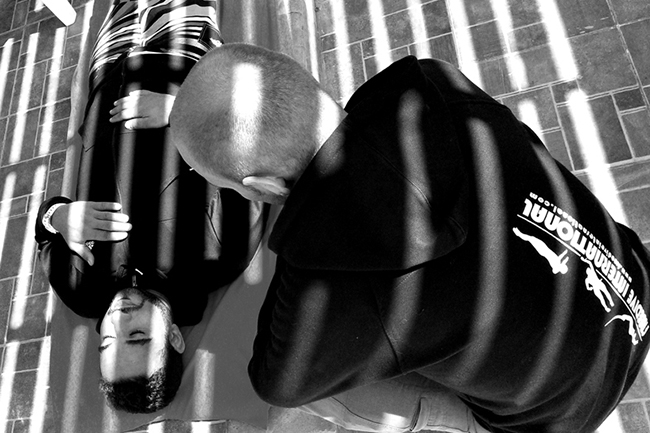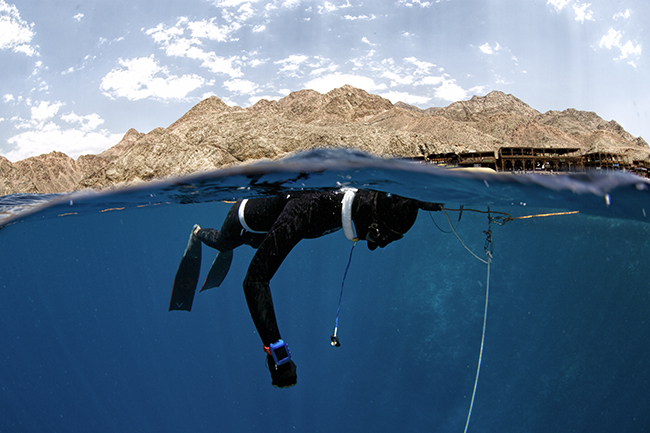Breathing and breathing-up are very important aspects for Freediving, but for a different reason than most people think.
I remember when I was learning how to freedive I was very confused about how to breathe properly.
The only thing that was clear was that the more air you inhale the longer you can stay underwater, and that taking a maximum inhale was therefore important.
The thing I was most confused about was breathing-up, i.e. how to breathe before a dive or a breath-hold.
When I learned freediving there were no real courses and no real instructors; if you wanted to freedive you had to teach yourself. Being self taught made things much more complicated, I had no one to teach me things and no one to ask questions about my doubts.
Soon enough I learnt that hyperventilation was a no-no, but which was the right way to breathe-up then?
Taking full breaths? Only breathing with the belly? How long should I breathe for? And how deep? How am i supposed to feel before I start my breath hold? Should I take 1 more breath? Am I ready now? Maybe one more breath. And how do i know if i am hyperventilating?
These questions were occupying my mind during my breathe-up, making me insecure and un-relaxed. I used to google pranayama and breathing exercises and tried out everything I found, which brought even more questions, such as “ok, but what do I do with this now?”.
I remember practicing these never ending breathing cycles, 8 counts in, 32 hold, 16 out, 4 hold and so on. It was hell, but I got the idea that I would never become a good Freediver if I didn’t do it right, and so I kept forcing myself into it.
Now it seems all so silly.

All our beginner courses have a full hour of “breathing and relaxation” class, where we teach our students how to breathe properly before a dive and how to use breathing to achieve relaxation.
Breathing has no secret really.
The whole purpose of a breathing-up is to relax. And however you do it is perfectly ok, as long as you don’t hyperventilate.
A healthy body is always fully saturated with oxygen (more precisely 98% is the average arterial saturation in non smokers), which means that with only 2 deep breaths the percentage will raise to 100%. So why do we make all the fuss about breathing-up?
Because it is the mind that needs to get ready for a dive, not your lungs!
The mind needs to believe that the body is ready for the breath-hold, and when the mind feels ready the relaxation is achieved, and you are ready to dive.
Of course there are also some other physiological effects that should be kept in mind and used to your own advantage. For example, if you perform long exhales your heart will slow down, so that you can start your dive with a lower heart rate and therefore with a lesser oxygen consumption during the first part of the dive.
However, achieving a relaxed mental state is certainly the main goal of breathing-up.
This means you are making a mistake and working against relaxation every time you are forcing your breathing, pushing its length, trying to fill more, or to exhale until you are empty – in short every breathing action that requires an effort to be performed.
Your mind can find peace in many different ways, but forcing your breathing in complicated patterns it’s not one of them.
So breathe-up in the most natural way, laying or standing in the most comfortable position you can find, while keeping your eyes closed, and try letting your mind wander to dreamland, forgetting about the worries, the depth, the time.

Linda breathing-up before a dive, at the Dahab/s Blue Hole, photo credit Jacques de Vos
How long you should my breathe-up be?
As i said, your body doesn’t really need a breathe-up; long breathe-ups are usually more damaging than helpful as they give you too much time to think ad doubt yourself.
When I started teaching people to freedive I realized that telling them: “Start when you are ready” didn’t really help much. On the contrary, made people think “am I ready?” during the whole time, killing relaxation and effectively stretching their breathe-up times in length, which not only is a waste of time but it can potentially lead to hyperventilation.
That’s when I learned the benefit of countdowns, not only for myself but also for my students. A short count-down doesn’t leave time for too much thinking and it also takes away the responsibility from you to decide when and if you are ready. Before all your dives, ask your buddy for a 2 or 3 minutes count-down and try to stick to it!
At the beginning it may feel unnatural and strange, but once you get used to a count-down you will understand how helpful it is.
By Linda Paganelli, 15 times italian record holder in all depth disciplines. Photo credits: Jacques De Vos, Wikimedia








